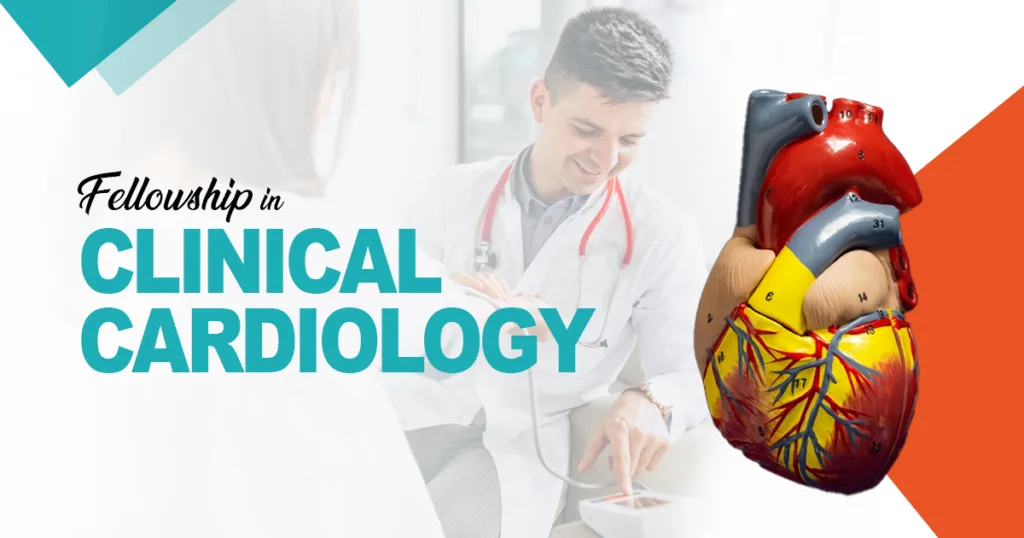
Cardiovascular disease is a primary global health concern that demands the ongoing evolution of specialised medical care. Cardiovascular diseases (CVDs) are responsible for 19.8 million deaths in 2022 globally. Due to factors such as urbanisation, stress, sedentary lifestyle and poor diets, India accounts for almost 60 per cent of the world's total cardiovascular diseases. So, there is an urgent need for medical professionals who can diagnose and provide early interventions to prevent and manage cardiovascular problems.
The Fellowship in Clinical Cardiology is a distinctive and essential learning program that offers medical professionals the opportunity to deepen their expertise in diagnosing, managing, and treating cardiovascular conditions. The following sections discuss the fellowship, covering its key features, benefits, and the career opportunities it presents to aspiring healthcare professionals.
The fellowship in Clinical Cardiology offered by MedicOLL Learning is a 12-month blended program of theoretical and practical learning. Medical experts design the curriculum and provide comprehensive knowledge on various topics, including the management of different cardiac disorders, the interpretation of ECGs (Electrocardiograms), the creation of tailored treatment plans, and various non-invasive procedures.
It covers areas such as:
The fellowship program has international collaborations and accreditation from global institutions, including the University of Liverpool, the Royal College of Physicians, eIntegrity, the NHS (UK), and Mangalayatan University. With CPD accreditation, the fellowship is valued across healthcare systems worldwide.
The Fellowship Program differs from standard postgraduate training, which requires years of full-time commitment, and follows a flexible combined-learning approach. This concept makes it ideal for medical professionals with demanding schedules who still wish to upgrade their expertise and advance their careers without pausing their clinical practice.
The primary objective of a Fellowship in Clinical Cardiology is to enhance the knowledge and skills of medical professionals in clinical cardiology, enabling them to manage complicated cardiac clinical cases with confidence and expertise.
A few of the objectives of the fellowship include:
Comprehensive Learning: The fellowship provides in-depth knowledge of clinical cardiology, enabling medical professionals to understand patients' conditions better and provide accurate diagnoses.
Clinical Hands-on Training: Equips the participants with clinical hands-on training in a multi-speciality hospital under the supervision of experienced cardiologists during the fellowship period. Participants gain practical exposure to managing acute and chronic cardiovascular diseases, such as coronary artery disease, heart failure, arrhythmias, and valvular heart disorders, in various clinical settings, including outpatient clinics, cardiac care units (CCUs), and catheterisation labs.
Cardiology Emergencies: Trains participants to stabilise patients presenting with chest pain, syncope, or cardiac arrest in emergency settings. The program also covers the application of Advanced Cardiovascular Life Support (ACLS) and advanced life support protocols. Quick decision-making in such situations directly impacts survival rates, making this component indispensable for the participants.
Cardiac Rehabilitation and Lifestyle Management: Provide participants with strategies to implement cardiac rehabilitation after myocardial infarction or surgery. Focus areas include guiding patients in exercise, nutrition, smoking cessation, stress management, and monitoring recovery and adherence to rehabilitation goals.
Enhanced Clinical Competence: The Fellowship offers extensive clinical experience, enhancing the ability to manage complex cardiac cases. The participants of the fellowship emerge with refined diagnostic acumen and therapeutic skills.
Career Advancement: Completing a Clinical Cardiology Fellowship opens opportunities for specialised positions in hospitals, academic institutions, and private practices. It also prepares for sub-specialities such as interventional cardiology, electrophysiology, or advanced heart failure and transplant cardiology, offering a bright future for aspiring medical professionals by equipping them with specialised skills that are significant in both clinical and pedagogical settings.
Leadership Opportunities: The fellowship provides participants with the opportunity to assume leadership roles in multidisciplinary teams. Participants may oversee cardiac units, contribute to healthcare policy, and lead educational initiatives for medical trainees.
Contribution to Research: With foundational knowledge of clinical research, participants can make significant contributions to the field of cardiology through innovation and research publications. This will further advance the understanding of cardiovascular diseases and the treatment of patients.
The Fellowship in Clinical Cardiology in India is designed for medical professionals exploring the field of clinical cardiology or practising physicians seeking to advance their careers. It also benefits medical professionals working in rural or semi-urban areas, where specialised cardiology services are scarce.
As the number of cardiovascular patients rises and the demand for skilled professionals to address the complex challenges in cardiovascular medicine grows, pursuing a Fellowship in Clinical Cardiology in India has become an excellent opportunity for medical professionals.By enrolling in this fellowship, participants gain exposure to extensive knowledge, clinical practice and cutting-edge research, all while collaborating with leading experts in the field.
This experience equips the participants with the necessary skills needed to provide outstanding cardiac healthcare, promotes career advancement, and pushes the boundaries of medical knowledge. Ultimately, this pathway not only enhances professional satisfaction but also plays a vital role in enhancing patient outcomes and advancing the field of cardiology.
Presently, India is continuously battling its cardiovascular disease burden; fellowships like this will help shape the next generation of cardiac care leaders.
© Copyrights Medicoll All rights reserved.